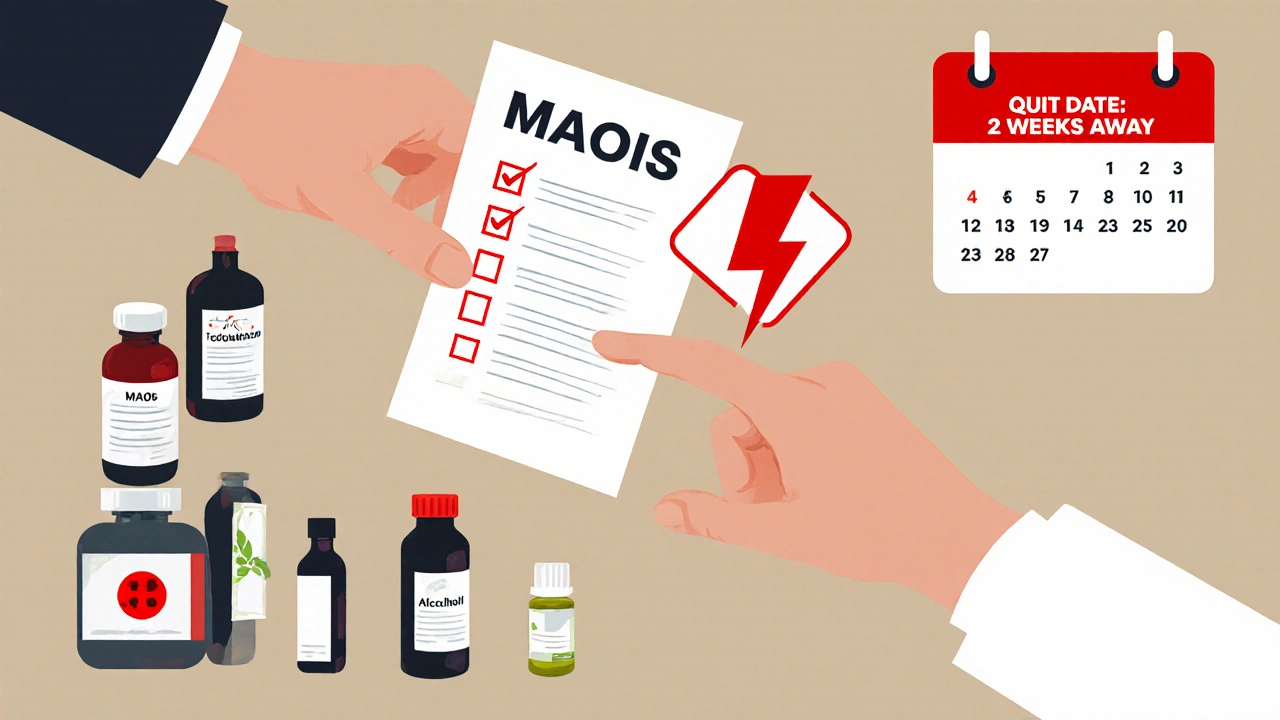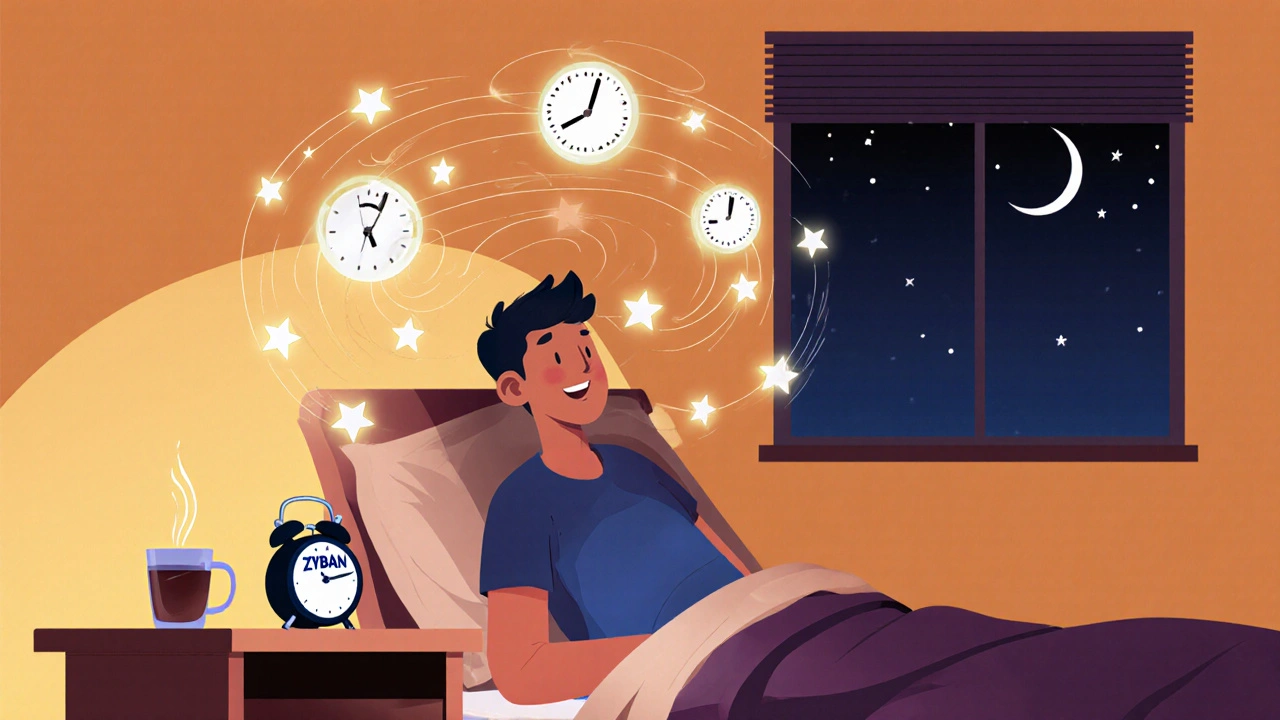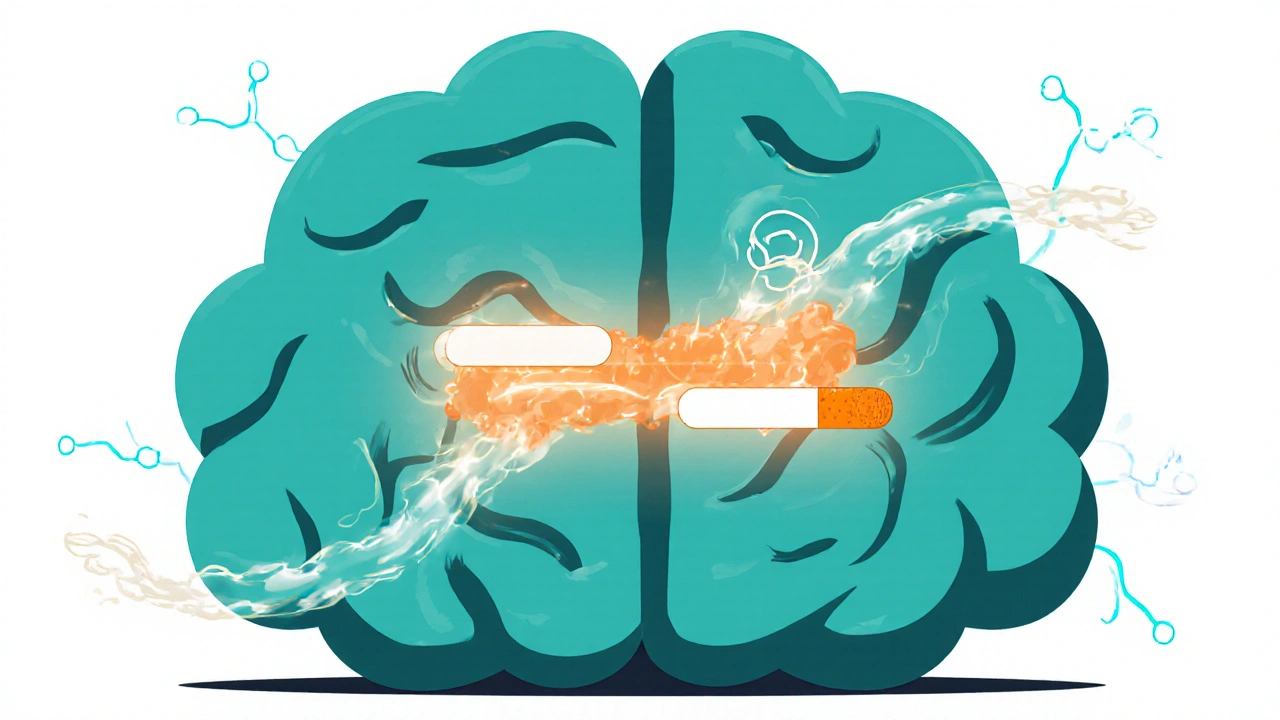Quitting smoking is hard. Even harder when you’re on other medications and don’t know if bupropion will play nice with them. Bupropion - sold as Zyban for quitting smoking - is one of the most used non-nicotine tools to break the habit. But it’s not harmless. It can clash with other drugs in ways that could put your health at risk. If you’re considering bupropion to quit smoking, you need to know what it interacts with - and what to watch out for.
How Bupropion Actually Works to Help You Quit Smoking
Bupropion isn’t nicotine. It doesn’t replace the craving like a patch or gum. Instead, it changes how your brain responds to the urge to smoke. It blocks the reuptake of dopamine and norepinephrine - two chemicals tied to reward and focus. That means when you feel that pull to light up, your brain isn’t as hungry for the hit of nicotine. Studies show it cuts cravings by about 40% compared to a placebo.
It also messes with nicotinic receptors in your brain, which are the exact spots nicotine latches onto. This dual action - boosting mood chemicals while blocking nicotine’s target - is why it works so well for some people. Clinical trials show that after six months, 19-23% of people using bupropion stay smoke-free. That’s two to three times higher than those on a sugar pill.
But here’s the catch: it doesn’t work right away. You need to start taking it 1-2 weeks before your quit date. It takes about 8 days for the drug to build up to steady levels in your body. If you wait until the day you quit to start, you’re setting yourself up to fail.
Who Shouldn’t Take Bupropion
Not everyone can use bupropion safely. There are clear red flags. If you’ve ever had a seizure, you shouldn’t take it. The risk is low - about 1 in 1,000 - but it’s real. The same goes if you have an eating disorder like bulimia or anorexia. These conditions already raise your seizure risk, and bupropion pushes it higher.
Another absolute no-go: monoamine oxidase inhibitors (MAOIs). These are older antidepressants like phenelzine or tranylcypromine. If you’ve taken one in the last 14 days, bupropion can cause a dangerous spike in blood pressure, confusion, or even a stroke. Even if you stopped an MAOI a month ago, talk to your doctor before starting bupropion. The waiting period isn’t just a suggestion - it’s life-saving.
And if you’re allergic to bupropion or have taken another bupropion product like Wellbutrin recently, skip it. You’re not helping yourself by doubling up.
Drug Interactions That Can Be Dangerous
Bupropion doesn’t just sit quietly in your system. It interacts with other drugs - some mildly, some dangerously.
MAOIs - already mentioned - are the most serious. But there are others:
- Varenicline (Chantix): The FDA warns against combining bupropion with varenicline. While the EAGLES trial didn’t find a major safety difference, the risk of severe neuropsychiatric side effects - like agitation, depression, or suicidal thoughts - is still a concern. Most doctors avoid mixing them unless absolutely necessary.
- Other antidepressants: SSRIs like fluoxetine or sertraline can increase bupropion levels in your blood. This raises your chance of side effects like insomnia, tremors, or seizures. If you’re already on an antidepressant, your doctor may lower your bupropion dose.
- Certain antipsychotics: Medications like haloperidol or risperidone can increase the risk of abnormal heart rhythms when taken with bupropion. Your heart’s electrical system gets jittery when these drugs mix.
- Alcohol: Drinking while on bupropion increases seizure risk. Even moderate drinking isn’t worth it. If you’re used to a drink or two after work, cut back completely while on this medication.
- CYP2B6-metabolized drugs: Bupropion is broken down by a liver enzyme called CYP2B6. If you’re taking other drugs that use the same enzyme - like methadone, cyclophosphamide, or some HIV meds - levels of either drug can build up. This can lead to toxicity. Genetic testing can tell you if you’re a slow or fast metabolizer, which affects how your body handles bupropion.
Even over-the-counter stuff matters. Cold medicines with dextromethorphan (like Robitussin DM) can raise your seizure risk when combined with bupropion. Herbal supplements like St. John’s Wort? Avoid them. They affect serotonin and can trigger serotonin syndrome - a rare but life-threatening condition.

Side Effects You Can’t Ignore
Most people tolerate bupropion okay. But side effects are common - and they can make you quit the medication before it even has a chance.
Insomnia is the biggest complaint. About 24% of users struggle with sleep. The fix? Take your second dose no later than 5 p.m. If you’re still wide awake at midnight, talk to your doctor about switching to once-daily dosing.
Headaches and dry mouth are mild but annoying. Drink water. Chew sugar-free gum. These usually fade after the first two weeks.
Nausea affects 13% of users. Take it with food. Don’t take it on an empty stomach. If nausea lasts more than a week, your dose might be too high.
The scariest side effect? Neuropsychiatric changes. Some people feel more anxious, depressed, or have unusual thoughts. In rare cases, suicidal ideation appears. This is why doctors monitor you closely during the first 4 weeks. If you feel worse - not better - after starting bupropion, call your provider immediately. Don’t wait. Don’t tough it out.
How Bupropion Compares to Other Quitting Tools
There are other options: nicotine patches, gum, varenicline, even counseling. So why pick bupropion?
Here’s the breakdown:
| Medication | 6-Month Quit Rate | Key Advantages | Key Drawbacks |
|---|---|---|---|
| Bupropion (Zyban) | 19-23% | No nicotine, works for depression, low cost ($35/month) | Delayed effect, insomnia, seizure risk |
| Varenicline (Chantix) | 19-22% | Stronger craving control, works faster | Nausea (22%), mood changes, expensive ($550/month) |
| Nicotine Replacement (Patch/Gum) | 16-18% | Immediate relief, safe for heart patients | Still delivers nicotine, withdrawal symptoms linger |
| Combination (Bupropion + NRT) | 25-31% | Best success rates, addresses both craving and withdrawal | More side effects, requires careful dosing |
For people with depression, bupropion is often the top pick. It helps both the quit and the mood. For those who can’t afford Chantix, it’s the most cost-effective option. And for people who hate the idea of replacing one nicotine source with another, it’s the cleanest choice.

Real People, Real Experiences
Online forums are full of stories. On Reddit, one user wrote: “Zyban eliminated my cravings completely after 10 days. I didn’t miss smoking at all.” Another said: “I didn’t gain 20 pounds like my sister did. That alone was worth it.”
But then there are the others: “Tried it twice. Both times, I couldn’t sleep. Quit after two weeks.” Or: “It just didn’t work fast enough. I was too desperate for a cigarette on day one.”
Surveys show that 28% of people quit bupropion because of side effects. Insomnia tops the list. But here’s the twist: those who stick with it for the full 7-9 weeks? 63% are smoke-free at 3 months. Those who quit early? Only 41% make it.
The message? Give it time. Stick with it. Don’t bail after the first rough week.
What to Do Before You Start
Don’t just walk into a pharmacy and ask for Zyban. Talk to your doctor first. Here’s what you need to cover:
- Full medication list: Include prescriptions, OTC drugs, supplements, and herbal products.
- Medical history: Seizures, mental health issues, eating disorders, heart problems.
- Alcohol use: Be honest. Even if you think it’s “just a few drinks.”
- Genetic testing: If your doctor is familiar with CYP2B6 metabolism, ask if testing is available. If you’re a slow metabolizer, you might need a lower dose.
- Quit date planning: Set it 1-2 weeks out. Start bupropion then. Don’t wait.
Also, set up support. Use the CDC’s Tips From Former Smokers program. Call a quitline. Join a group. People who use extra support are 45% more likely to stick with bupropion.
What Happens After You Quit?
Most people think once they stop smoking, they can stop the pill. Don’t. Bupropion works best when you take it for the full 7-9 weeks - even if you’ve been smoke-free for a month. Stopping early increases your chance of relapse.
And here’s the hard truth: bupropion doesn’t rewire your brain permanently. Its effects fade after you stop taking it. That’s why long-term success depends on behavior change - avoiding triggers, finding new habits, managing stress without cigarettes.
There’s hope, though. New studies are testing extended-release versions and combo therapies with nicotine patches. One 2023 trial showed 31% quit rates with bupropion plus patch - better than either alone.
For now, bupropion remains a powerful, affordable tool. But it’s not magic. It’s medicine. And like all medicine, it needs respect - and careful use.
Can I take bupropion if I’ve had a seizure in the past?
No. If you’ve ever had a seizure - even one years ago - bupropion is not safe for you. It lowers your seizure threshold, and the risk is real. Your doctor will likely recommend nicotine replacement therapy or varenicline instead.
How long does it take for bupropion to start working?
It takes 7-10 days for bupropion to build up in your system. That’s why you start taking it 1-2 weeks before your quit date. If you wait until you quit to start, you’ll be fighting cravings without any medication support.
Is bupropion safe if I have high blood pressure?
Bupropion can raise blood pressure in some people. If you have uncontrolled hypertension, your doctor may avoid it. If your blood pressure is stable on medication, you might still use it - but you’ll need closer monitoring. Check your BP weekly during the first month.
Can I drink alcohol while on bupropion?
It’s not recommended. Alcohol increases your risk of seizures while taking bupropion. Even moderate drinking - like a glass of wine or a beer - can be risky. If you choose to drink, limit it to very small amounts and never binge. Better yet, avoid it entirely until you’ve finished your course.
What should I do if I miss a dose?
If you miss a morning dose, take it as soon as you remember - but only if it’s before 5 p.m. If it’s later, skip it. Never double up. Taking two doses too close together raises your seizure risk. If you miss two days in a row, call your doctor before restarting.
Will bupropion help me quit vaping too?
Yes. Emerging evidence shows bupropion works for vaping cessation as well. The same brain pathways involved in nicotine addiction from cigarettes apply to e-cigarettes. A 2024 study found similar quit rates for vaping and smoking when using bupropion. It’s not officially approved for vaping yet, but many doctors prescribe it off-label with good results.
If you’re serious about quitting, bupropion can be a game-changer - but only if used correctly. Know your risks. Know your meds. And don’t go it alone. Talk to your doctor, stick with the plan, and give yourself the best shot at staying smoke-free for good.


Post A Comment